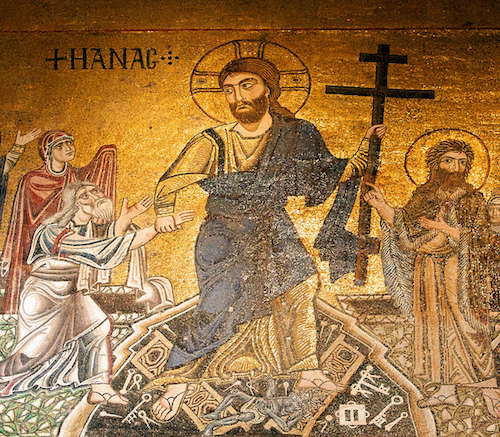We run our website the way we wished the whole internet worked: we provide high quality original content with no ads. We are funded solely by your direct support. Please consider supporting this project.

How the Anabaptists Emphasized the Cross
Because the Anabaptists have generally emphasized faith that is evidenced by works and thus on Jesus’ life as an example to be followed, it may prima facia appear that the saving work of the cross was less central to the early Anabaptists than it was to the Reformers and to Evangelicals. In reality, I would argue, this is not at all the case.
Given how persecuted the early Anabaptists were, it’s not surprising that they rarely discussed atonement theories in a formal way, let alone that they never embraced any particular theory. However, when Sattler, Hubmaier, Denck and other Anabaptist leaders did write and speak about the work of Christ on the cross, they actually reflect aspects of each of the major models of the atonement in Church history. Yet, in summing up their views, Thomas Finger observes that, “[a]mong traditional models … Christus Victor can be called historic Anabaptism’s primary expression of Jesus work.” This is true, however, only “providing we add that they experienced this as more present and participatory, and more specifically shaped by Jesus’ life than most.”[1]
In other words, the central emphasis tended to be on the manner in which Jesus’ humble, self-sacrificial life and death defeated forces of evil. Yet, this emphasis was not only regarding what Jesus did for us; it included what Jesus does in us and through us. To use Finger’s terminology, their Christus Victor model was not only “conflictive” but “transformative.”[2] Because they understood Jesus’ cruciform way of defeating the powers to be something they are called to participate in, they refused to engage in violence, even as an act of self-defense when persecuted and martyred by other Christian groups.
In this light, I would argue that, in a wholly informal way, the early Anabaptists tended to integrate Jesus’ death with every other aspect of his life, which is precisely the position I argue in Crucifixion of the Warrior God. And so, while one doesn’t typically find as strong a formal emphasis on the saving significance of the cross among them as one finds among the Reformers and Evangelicals, I would argue the cross was no less thematically central to them than it was to these others.
If anything, I would argue it is more central inasmuch as the Anabaptists understood the cross not only to be the thematic center of everything Jesus was about, but also as the thematic center of everything his followers are to be about. As is the case in the NT, the early Anabaptists generally understood that to follow the one who lived a cruciform life and died a cruciform death, one must be willing to adopt a cruciform lifestyle.
[1] T. Finger, A Contemporary Anabaptist Theology: Biblical, Historical, Constructive (Downers Grove, IL: IVP, 2006), 350.
[2] ibid., 341, 343
Photo credit: Nick in exsilio via Visual Hunt / CC BY-NC-SA
Category: General
Tags: Anabaptists, Christus Victor, Cross, Cruciform Theology, Jesus
Related Reading

Responding to Driscoll’s “Is God a Pacifist?” Part I
I’m sure many of you have read Mark Driscoll’s recent blog titled “Is God a Pacifist?” in which he argues against Christian pacifism. I’ve decided to address this in a series of three posts, not because I think Driscoll’s arguments are particularly noteworthy, but because it provides me with an opportunity to make a case against what I’ve…

Podcast: Does God Strike Jesus Down?
Greg looks at how Matthew uses the Old Testament—specifically, Matthew 26:31. http://traffic.libsyn.com/askgregboyd/Episode_0258.mp3

Why Christ, not Scripture, is Our Ultimate Foundation
In a previous blog I argued that all our theological reflection must not only be Christ-centered, it must, most specifically, be cross-centered. I now want to begin to unpack some of the most important implications of adopting a cross-centered theological perspective. My ultimate goal is to show how a cross-centered theology is able to resolve the…

What to Do If You See God as Violent
God really is as beautiful as he is revealed to be on Calvary. Communicating this is my goal in everything I write—especially Crucifixion of the Warrior God and Cross Vision. But for many, to see him as being that loving, is not easy. We have to make a concerted effort for our brains to adjust…

Imaging God Rightly: God’s Self-Portrait, Part 3
In the previous two blogs I noted that the vision of God in our minds is the single most important vision in our lives, for it completely determines whether we’ll have a relationship with God and what kind of relationship this will be. A. W. Tozer once wrote, “What comes into our minds when we…

Quotes to Chew On: Conflicting Depictions of God
“This is something like the way I believe we should respond when we encounter biblical narratives that depict God doing things we can’t imagine Christ doing. For example, I can’t for a moment imagine Jesus—the one who made refusing violence and loving enemies a condition for being considered a child of God—commanding anyone to mercilessly…
